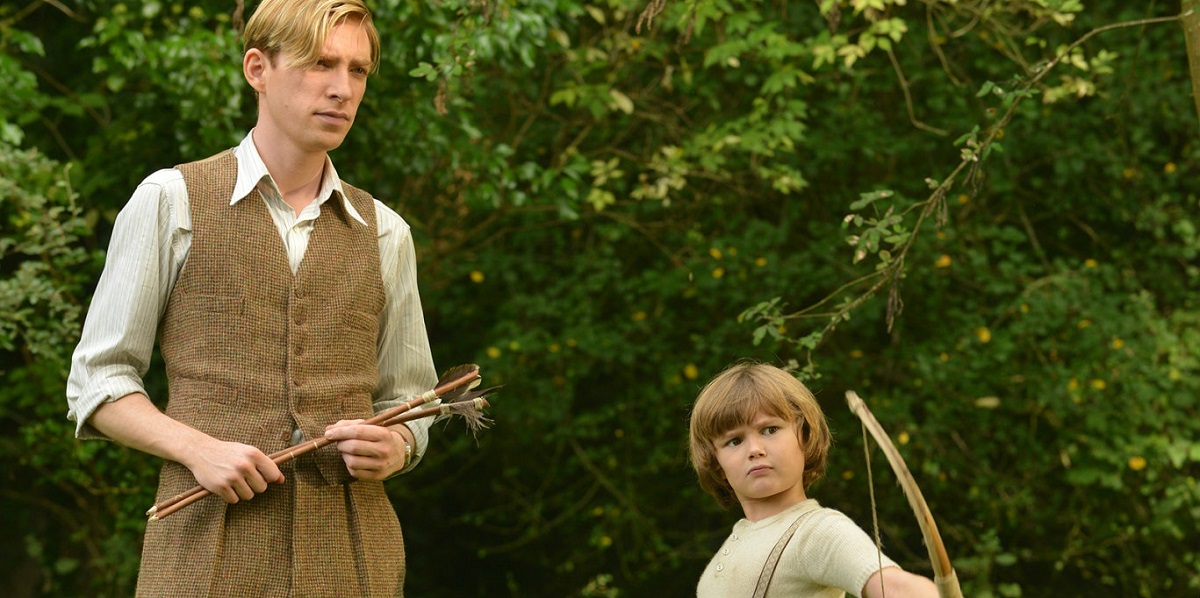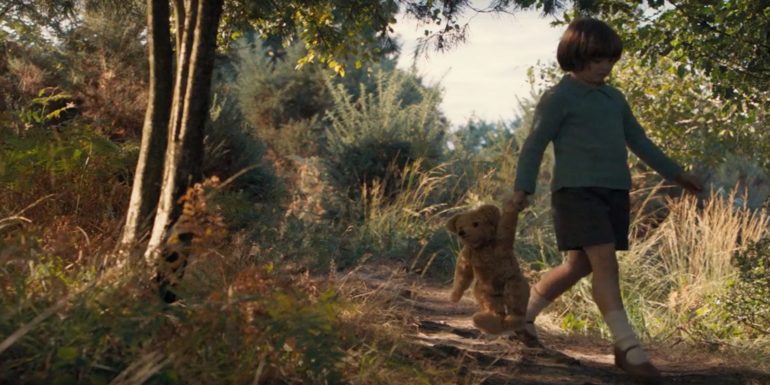Out this week in cinemas is Goodbye Christopher Robin, the based on a true story film about the creation of the iconic Winnie the Pooh by author A.A. Milne. Starring as A.A. Milne the father of everyone’s favourite bear is Domhnall Gleeson and by his side, as his ever faithful wife, Daphne de Sélincourt is Margot Robbie. The story of Goodbye Christopher Robin follows Milne and his relationship with his young son Christopher Robin Milne played by newcomer Will Tilston and how through their bonding the world of 100 Acre World was created.
Have you ever heard of the series ‘Behind The Music’ where the tagline was “You think you know, you have no f***ing idea”? Well, Goodbye Christopher Robin is the film equivalent of that series because what audiences learn about A.A. Milne, his son the inspiration of Christopher Robin, and Winnie the Pooh the whimsical bear will change your view on that character forever. Simon Curtis the director goes for an all too real interpretation of the origin of Winnie and the residents of the 100 Acre Wood, he’s clearly going for an Oscar nod with his close-up shots of Milne when he recalls the horrors of WWI and how he uses the imagination of his son to help cope with the trauma. At first, it works well but as the film shifts from a man trying to find hope with the creation of a new world to what can be described as the story of the first child star the effectiveness is lost.
Goodbye Christopher Robin is a film of two halves, the first half is about a father and son and their relationship creating something wonderful and magical and that’s the usual kind of Oscar bait film you expect this time of year. The other half veers into a loss of innocence as the fame of Winnie the Pooh swallows up its creators and essentially ruins a child’s life. With Billy, the affectionate nickname given to Christopher Robin by his parents, taking countless photo’s with fans, signing autographs, and even meeting nobles there is a sense of cynicism in Goodbye Christopher Robin that was unexpected and off-putting. Margot Robbie is the personification of this cynical edge as Daphne doesn’t seem to love her child, she just seems to have a fondness akin to an owner and their pet. She trots her son out in front of audiences and doesn’t care for the toll it is having on him. Daphne is a pampered princess who hides behind her admiration of her husbands work so that no one realises she’s an incredibly shallow woman, simply looking for the glitz and glamour that follows his success. The best way to describe her in a modern context is she is the first pageant mom, nothing will stop her from getting her child to that tiara so that she too can bask in its ambient glory. It’s disturbing because she’s quite the personality, nothing can stop her, not the loving nanny (Kelly Macdonald) who is a much more maternal figure to Billy, and not the father who she holds under her thumb at times.
There is a shining star in Goodbye Christopher Robin in the shape of Will Tilston who is unapologetically charming as the inspiration of the young boy who visited 100 Acre Wood all those years ago. He commands the scenes he is in and his chemistry with his nanny Olive (Macdonald) and father is wonderfully sweet. These are easily the best scenes in the film and highlight the strengths of this film, unfortunately, they also highlight the problems.

For example, the direction of the film is quite simplistic. At times Curtis’ choice of scene transitions takes away from the full emotional impact that could potentially have been achieved. There is one scene in particular that comes to mind as Milnes finally realises the damage this “fame” is doing to Billy and there is a realisation in his face and before the audience has a chance to live in this moment with him the scene cuts to something else and you’re taken away from that emotional place. He makes up for it in other places of the film but it’s disappointing to see such wasted opportunities. The cinematography, on the other hand, is a highlight of Goodbye Christopher Robin as there are scenes that feel ripped from the pages of Milne’s work and the colour palette of the film is quite warm and vibrant and it shifts to match the emotional tone of the scene which works quite well even if it is a little too obvious.
There’s also the unintentional issue that Curtis creates within the film, the audience comes out feeling guilty about their love of Winnie the Pooh because in this film we learn that Billy Moon felt betrayed by his father who “sold” his childhood to the world. It’s this theme that will put off many families from seeing this film and because of that Curtis may have succeeded in telling the story but he has failed in capturing the spirit and love that Winnie the Pooh has given to many people around the world.
This brings me to the realisation that though Goodbye Christopher Robin has a decent cast, some beautiful imagery, and a career-making performance from young Will Tilston it is let down by many poor decisions from its director Simon Curtis. Head along to Goodbye Christopher Robin if you’re interested in the story of Winnie the Pooh, just know there is an edge to this tale that may not be palatable to the young ones in the family.

